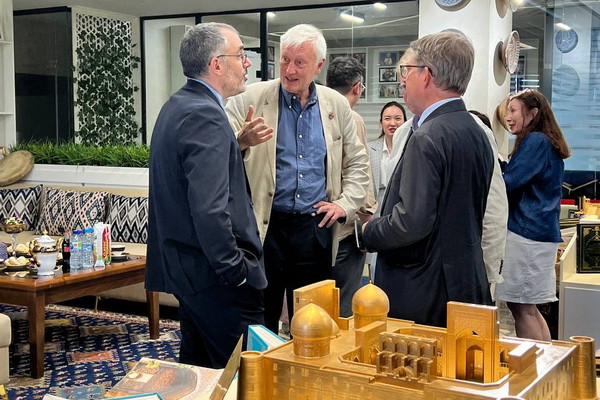
Experts from Europe about WOSCU projects: an impressive contribution to world oriental studies
Tashkent, Uzbekistan (UzDaily.com) -- A scientific briefing was held at the office of the World Society for the Study, Preservation and Promotion of the Cultural Heritage of Uzbekistan (WOSCU) with the participation of leading scientists from Uzbekistan, Great Britain, Austria and the Netherlands. During the event, the prospects for joint research and publications in the field of cultural heritage, as well as issues of strengthening international cooperation were discussed.
Researchers have received particular attention from studies in the field of culture and history, as well as social projects aimed at improving interaction between different cultural communities. The guests got acquainted with the 70-volume series “Cultural Heritage of Uzbekistan in the World’s Collections”, the 20-volume “Architectural Epigraphy of Uzbekistan”, handwritten monuments published in the form of facsimiles, gift editions, as well as documentaries.
One of the key moments of the visit was getting acquainted with the large-scale projects that are being implemented in New Uzbekistan under the leadership of President Shavkat Mirziyoyev in the field of preserving cultural heritage and developing science, which the Chairman of WOSCU, Dr. Firdavs Abdukhalikov, told foreign scientists about. He also presented new directions of work of the World Society.
- One of the main difficulties was establishing contacts with some foreign scientific institutions. Previously, this process was difficult due to differences in approaches to the protection of cultural heritage, as well as bureaucratic barriers. A breakthrough in this direction became possible thanks to the persistence and determination of the President of our country, the intensification of the work of international partners, the WOSCU team, as well as the support of socially responsible business represented by the Eriell Group, which share our desire to preserve and study the cultural heritage of Uzbekistan. So today, as part of a scientific meeting with scientists and representatives of museums, we not only attracted attention to our projects, but also enlisted the support of influential experts in the field of oriental studies and manuscript heritage. We hope that now our project will be enriched with new research and scientific discoveries. Established contacts will allow us to gain access to unique artifacts and documents, which, in turn, will allow us to significantly expand our knowledge about the cultural heritage of Uzbekistan and prepare a number of scientific publications and books that will be useful for both specialists and a wide audience.
Nicholas Kontovas, a specialist at the Bodleian Library at Oxford University, noted the significant support provided to the fields of science and culture in Uzbekistan.
- I see you are doing a very great job. WOSCU has published several books about the Cambridge collections. It would be great if you could publish a book about the collection of the Bodleian Library, because in our collection there are 200 copies of manuscripts written in the Old Uzbek language. There are a number of manuscripts written in Arabic and Persian that I would be happy to collaborate with WOSCU to research and publish them. The amazing support for science and culture that is felt here is rare in other countries. Today it is becoming increasingly difficult to promote such large-scale cultural projects, and I am happy that in Uzbekistan such attention is paid to its history and culture. This experience greatly enhances the reputation of Uzbekistan in other countries,” he noted.
Firyuza Melville, member of the scientific council of the World Society, expressed deep gratitude for the opportunity to participate in each WOSCU congress.
– I would like to especially note the significant contribution of the Chairman of the Board of Trustees, Bakhtiyor Fazylov, to the successful implementation of numerous initiatives and projects of the World Society. Its efforts help promote cultural and scientific exchange at the international level, enriching the world community with new knowledge and cultural achievements.
Ilse Sturkenboom, professor of the history of Islamic art at the Ludwig Maximilian University of Munich, studies manuscripts from Central Asia. “The WOSCU office - with its blue ceiling and gold stars - is very consistent with the aesthetics of the 14th-16th centuries in Uzbekistan. I think it is a great idea to go in search of Central Asian art in foreign museums and libraries. We know that the travel of Uzbek art objects was connected with the art market. But at the same time, it is also connected with the fact that already in the 16th century Boburid India was very interested in Uzbek art. So you not only reconstruct your heritage in books, but also explore its routes, origins and movements.
The orientalists were happy to share their knowledge and experience, and also expressed a desire to continue cooperation in this area. They emphasized the importance of such research for the preservation of cultural heritage and its transmission to future generations.
Jamie Comstock-Skipp, researcher at the University of Oxford - Fellow of the World Society. “I have been participating in WOSCU international congresses for several years now. My specialty is the research of Shaybanid manuscripts. I really respect the collaboration and international cooperation that the World Society conducts and I am ready to contribute to the study of the Sheybanid period in Central Asia. It is extremely important to popularize this unique project as widely as possible and distribute publications to as many scientific and educational institutions as possible in the country and the world.”
The guests noted the high level of projects in the field of preserving cultural heritage being implemented in New Uzbekistan and expressed a desire to continue fruitful cooperation in the future.